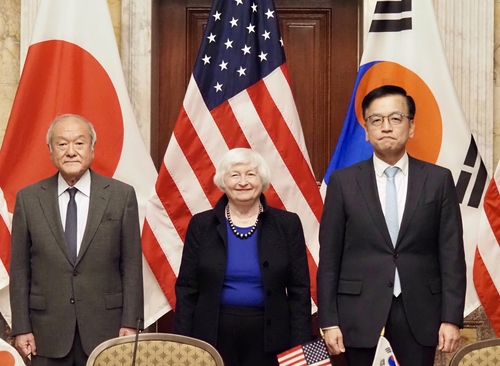
![Korea's Finance Minister Choi Sang-mok, right, U.S. Treasury Secretary Janet Yellen, center, and Japan's Finance Minister Shunichi Suzuki pose for a photo prior to their first trilateral meeting in Washington on April 17, 2024. [YONHAP]](https://moneylowdown.com/wp-content/uploads/2024/04/e005df57-252d-4bb4-ba7a-b672cbb80f1c.jpg)
Korea’s Finance Minister Choi Sang-mok, right, U.S. Treasury Secretary Janet Yellen, center, and Japan’s Finance Minister Shunichi Suzuki pose for a photo prior to their first trilateral meeting in Washington on April 17, 2024. [YONHAP]
Finance Minister Choi Sang-mok stressed the need for Korea to cooperate with the United States and Japan in addressing market volatility.
The finance chiefs of Korea, the United States and Japan acknowledged “serious concerns” over the recent “sharp” depreciation of the Korean won and Japanese yen during their first trilateral talks in Washington on Wednesday, in a coordinated message to help address growing market volatility.
Choi, U.S. Treasury Secretary Janet Yellen and Japan’s Finance Minister Shunichi Suzuki issued a joint press statement following the talks — a follow-up to an agreement from their countries’ landmark trilateral summit at Camp David in Maryland in August.
At the summit, President Yoon Suk Yeol, U.S. President Joe Biden and Japanese Prime Minister Fumio Kishida reached the agreement to launch the finance ministers’ meeting in a series of outcomes aimed at institutionalizing tripartite cooperation on multiple fronts, including security.
“We will also continue to consult closely on foreign exchange market developments in line with our existing G20 commitments, while acknowledging the serious concerns of Japan and the Republic of Korea about the recent sharp depreciation of the Japanese yen and the Korean won,” they said in the statement.
The three officials stressed their commitment to continuing cooperation to “promote sustainable economic growth, financial stability, as well as orderly and well-functioning financial markets.”
The meeting came as the Korean and Japanese currencies have weakened amid expectations that the U.S. Federal Reserve could keep its key rates steady and start rate cuts later than anticipated.
Adding to market volatility is growing instability in the security landscape of the Middle East. Iran launched more than 300 drones and missiles on Israel on Saturday, in response to a suspected Israeli strike on an Iranian diplomatic mission in Syria on April 1.
The won broke 1,400 against the greenback during Tuesday’s intraday trading, which was the first since 2022. It forced the finance ministers of Korea and Japan to express their intention to take appropriate action against excessive movement in foreign exchange rates.
Choi, Yellen and Suzuki highlighted their cooperation over China-related issues as well, though they did not mention China by name.
“We emphasize the importance of collaboration to overcome supply chain vulnerabilities and the possible harm to our economies from nonmarket economic practices of other countries, including economic coercion and overcapacity in key sectors,” they said.
Moreover, the three sides affirmed their commitment to utilize and coordinate their countries’ respective sanctions tools “to impose costs” on Russia for its war against Ukraine and target North Korea’s weapons program.
“We strongly condemn the DPRK’s exports to Russia, as well as Russia’s procurement of the DPRK’s ballistic missiles, in direct violation of relevant U.N. Security Council Resolutions, and call upon them to immediately cease such activities,” they said.
DPRK stands for the North’s official name, the Democratic People’s Republic of Korea.
BY JIN MIN-JI, YONHAP [[email protected]]



